Summary of Pulse Diagnosis

Song of the Five Organs and Pulse:
Floating indicates the heart and lungs; sinking indicates the kidneys and liver; the spleen and stomach are in the center, between floating and sinking.
The heart pulse is floating, large and scattered; the lung pulse is floating, rough and short;
the liver pulse is sinking, deep and long; the kidney pulse is sinking, solid and moist;
the spleen and stomach belong to earth, the pulse should be harmonious and gentle, known as the fire of life, the left inch is the same as the break.
Spring is for the string, summer for the flood, autumn for the hair, winter for the stone; the four seasons are harmonious, this is called a balanced pulse.
Too strong and solid, illness arises externally; too weak and subtle, illness arises internally.
Spring obtains autumn pulse, death occurs on the day of metal, the five organs are based on this, and the deduction is not lost.
In all seasons and diseases, the stomach qi is fundamental, the pulse is precious and must be examined.
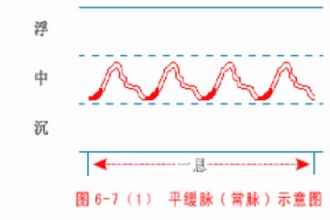
1. Floating Pulse:
The pulse is at the floating position, lightly taken it is obtained, pressing harder it slightly decreases, but does not feel empty.
〔Main Disease Poem〕
Floating pulse indicates exterior yang diseases, slow wind, numerous heat, tight cold.
Floating and strong indicates much wind-heat; weak and floating indicates blood deficiency.
Floating at the inch indicates headache and dizziness from wind, or there is phlegm and wind gathering in the chest.
At the guan, earth is weak and wood is strong; at the chi, urination is not smooth.
Floating pulse indicates exterior, strong indicates excess, weak indicates deficiency; floating slow indicates wind-cold, floating rapid indicates wind-heat, floating tight indicates wind-cold, floating soft indicates wind-damp, floating weak indicates heat from summer, floating scattered indicates exhaustion.
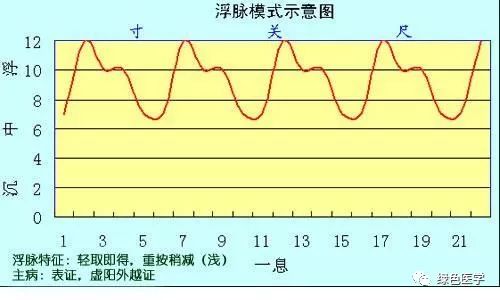
2. Sinking Pulse:
The pulse is located below, only felt with heavy pressure, lightly taken it does not respond.
〔Main Disease Poem〕
Sinking indicates water accumulation in the yin channels, rapid heat and slow cold with phlegm.
Weak and sinking indicates deficiency of qi; sinking and strong indicates accumulation and cold.
Floating at the inch indicates phlegm and water stagnation in the chest; at the guan indicates internal cold pain and obstruction.
At the chi, turbidity and leakage with diarrhea; kidney deficiency affects the lower source.
Sinking pulse indicates interior, strong indicates excess, weak indicates deficiency. Sinking indicates qi, also indicates water accumulation, sinking slow indicates chronic cold, sinking rapid indicates internal heat, sinking slippery indicates food phlegm, sinking rough indicates qi stagnation, sinking weak indicates cold-heat, sinking soft indicates cold-damp, sinking tight indicates cold pain.
3. Slow Pulse:
One breath three beats, coming and going slowly.
〔Main Disease Poem〕
Slow pulse indicates organ disease or much phlegm, chronic stagnation requires careful observation.
Strong and slow indicates cold pain; slow and weak indicates definite deficiency and cold.
At the inch, slow indicates upper jiao cold; at the guan indicates internal cold pain unbearable.
At the chi, indicates kidney deficiency, heavy waist and feet, urination not controlled, hernia pulling.
Slow pulse indicates organ, strong indicates cold pain, weak indicates deficiency and cold. Floating slow indicates exterior cold, sinking slow indicates interior cold.
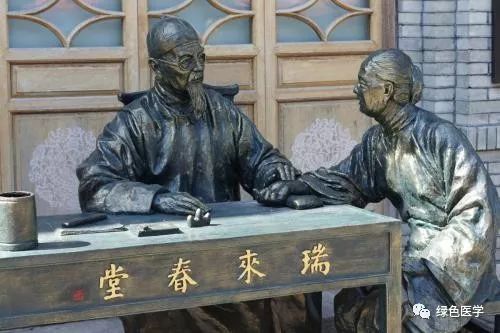
4. Rapid Pulse:
One breath six beats, coming and going relatively fast.
〔Main Disease Poem〕
Rapid pulse indicates yang heat, just treat with the fire of the lord.
Excess should cool and drain, deficiency should warm and tonify; lung disease in autumn is to be feared.
At the inch, rapid indicates throat and tongue sores, vomiting blood, coughing with lung ulcers.
At the guan, indicates stomach fire and liver fire; at the chi, indicates nourishing yin and lowering fire decoction.
Rapid pulse indicates bowels, strong indicates excess fire, weak indicates deficiency fire. Floating rapid indicates exterior heat, sinking rapid indicates interior heat, qi mouth rapid indicates excess lung abscess, rapid weak indicates lung atrophy.
5. Weak Pulse:
Floating large, slow and soft, pressing it feels empty.
〔Main Disease Poem〕
Weak pulse with body heat indicates heat injury; spontaneous sweating, palpitations, and anxiety are common.
Fever with yin deficiency must be treated early; nourishing the nutrients and benefiting qi must not be delayed.
Blood does not nourish the heart, inch pulse is weak; at the guan, abdominal distension and difficulty in digestion.
Bone steaming, atrophy, injury to essence and blood, yet resides in the spirit gate of both parts.
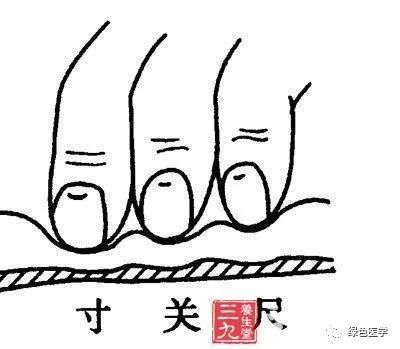
6. Solid Pulse:
Firm and strong, felt with both light and heavy pressure.
〔Main Disease Poem〕
Solid pulse indicates yang fire accumulation, causing mania, delirium, and frequent vomiting.
It may be yang toxin or food injury, constipation or qi pain.
At the inch, solid indicates facial heat and wind; at the guan, throat pain, tongue stiff, qi fills the chest.
At the chi, solid indicates waist and intestinal pain and obstruction.
7. Large Pulse:
Large and strong, responding to the fingers with fullness.
〔Main Disease Poem〕
Large pulse with strength indicates excess evil; excess yang heat leads to diarrhea.
Yin qi is insufficient while yang is excessive; deficiency labor with large pulse must be weak.
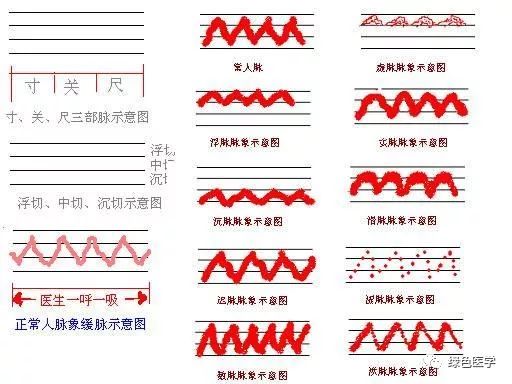
8. Small Pulse:
Small like a thread, clearly felt.
(Also known as fine pulse)
〔Main Disease Poem〕
Fine pulse indicates blood and qi deficiency, various deficiencies and emotional disturbances.
If not due to dampness invading the kidneys, it is due to injury to essence and excessive sweating.
At the inch, fine indicates frequent vomiting; at the guan, abdominal distension and stomach deficiency.
At the chi, indicates cold in the dan tian, leakage of essence, and loss of yin.
Fine pulse indicates blood deficiency and injury; in women, pregnancy indicates fetal disease, without pregnancy indicates blood loss.
《Pulse Classic》 states: fine indicates blood deficiency and qi weakness. If this symptom is present, it is favorable; otherwise, it is unfavorable. Therefore, vomiting and bleeding with sinking fine pulse indicates life. Excessive worry leads to fine pulse.
9. Long Pulse:
Ends straight, exceeding three positions, like following a long pole.
〔Main Disease Poem〕
Long pulse indicates evenness of size, abnormality indicates disease like a pulling rope.
If not due to yang toxin epilepsy, it is due to deep yangming heat. (Long indicates excess disease)
10. Short Pulse:
Short and contracted, unable to fill the entire position.
〔Main Disease Poem〕
Short pulse is only found at the inch and chi, short and slippery indicates wine injury to the spirit.
Floating indicates blood stasis, sinking indicates fullness; inch indicates headache, chi indicates abdominal pain.
(《Classic》 states: short indicates qi disease, short indicates disease of insufficiency)
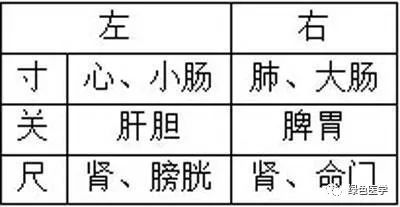
11. Slippery Pulse:
Flowing and smooth, entering and exiting like pearls, felt with both light and heavy pressure, responding round and smooth.
〔Main Disease Poem〕
Slippery pulse indicates decline of yang vitality, phlegm causes various diseases, food causes disasters.
Above indicates vomiting and reversal, below indicates blood accumulation; women’s pulse is regulated, indicating pregnancy.
At the inch, slippery indicates phlegm causing vomiting; at the guan, indicates sour swallowing, tongue stiff, or coughing.
At the guan, indicates retained food, liver and spleen heat; thirst, diarrhea, and turbid urination observed at the chi.
Slippery indicates phlegm and drink; floating slippery indicates wind phlegm, sinking slippery indicates food phlegm, slippery rapid indicates phlegm fire, slippery short indicates retained food.
12. Rough Pulse:
Flowing and difficult, like rain touching sand, fine, slow and short, fingers feel dull.
〔Main Disease Poem〕
Rough indicates blood deficiency or injury to essence, reverse stomach, loss of yang, sweating rain.
Cold dampness entering the nutrients causes blood stasis; in women, if not pregnant, indicates absence of menstruation.
At the inch, rough indicates heart deficiency pain in the chest; at the guan, stomach deficiency and rib distension observed.
At the chi, indicates both essence and blood injury; intestinal obstruction, urination, or blood in stool.
Rough indicates blood deficiency and injury to essence; in women, pregnancy indicates fetal disease, without pregnancy indicates blood loss.
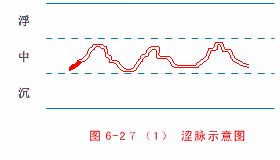
13. String-like Pulse:
Straight and long, like pressing a guitar string, upright and urgent.
〔Main Disease Poem〕
String-like indicates the liver and gallbladder channels, phlegm and cold heat plague the body.
Floating, sinking, slow, and rapid must be distinguished; large and small have weight.
At the inch, string-like indicates headache and much phlegm; at the guan, cold and heat stagnation observed.
At the guan, right indicates stomach cold and abdominal pain; at the chi, indicates yin hernia and leg cramps.
String-like indicates wood excess disease. Floating string-like indicates external overflow; sinking string-like indicates internal pain. Malaria pulse is string-like; string-like rapid indicates much heat, string-like slow indicates much cold. String-like large indicates deficiency, string-like fine indicates tight urgency. Yang string-like indicates headache, yin string-like indicates abdominal pain. Single string-like indicates drink habit, double string-like indicates cold stagnation. If not eating, wood overcomes earth, must be difficult to treat.
14. Rapid Pulse:
Pulse comes quickly, rapid with one stop, stop without regularity.
〔Main Disease Poem〕
Rapid pulse indicates fire disease, its cause has five details (qi, blood, phlegm, drink, food).
At times, wheezing and coughing are all due to phlegm accumulation, or mania and spots with toxic sores.
Rapid indicates excess yang disease. Rapid and knotty causes are all due to qi, blood, phlegm, drink, and food. Any stagnation will cause the pulse to stop.
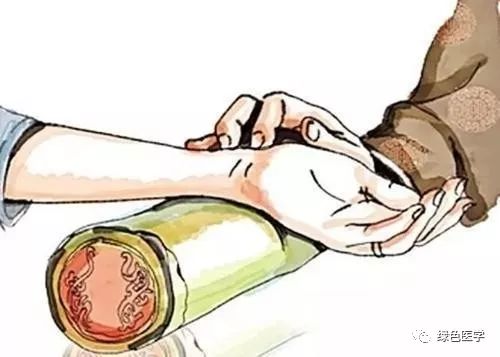
15. Knotty Pulse:
Pulse comes slowly, slow with one stop, stop without regularity.
〔Main Disease Poem〕
Knotty pulse is due to qi and blood stagnation, old phlegm accumulation causes deep sighs.
Internal accumulation leads to external swelling; hernia and stagnation are calamities belonging to yin.
Knotty indicates excess yin disease. The more knotty, the more accumulation; the less knotty, the less qi. Floating knotty indicates external pain accumulation; sinking knotty indicates internal accumulation.
16. Intermittent Pulse:
Slow with one stop, stop for a long time, returning after a long time, stop has a fixed number.
〔Main Disease Poem〕
Intermittent pulse is due to organ qi decline, abdominal pain, diarrhea, and lower source deficiency.
Or due to vomiting and diarrhea in the middle palace, women pregnant for three months.
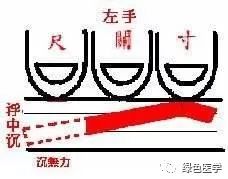
17. Slow Pulse:
Calm and gentle, one breath four beats.
〔Main Disease Poem〕
Slow pulse indicates nutrient decline and excess defense, or wind, or dampness, or spleen deficiency.
Above indicates neck stiffness, below indicates atrophy; distinguish floating and sinking, large and small.
At the inch, slow indicates wind evil neck and back stiffness; at the guan indicates dizziness and stomach deficiency.
At the chi, indicates spirit gate leakage or wind secret; or limping foot strength is weak.
Floating slow indicates wind; sinking slow indicates damp; large slow indicates wind deficiency; fine slow indicates damp atrophy; rough slow indicates spleen deficiency; weak slow indicates qi deficiency.
18. Flood Pulse:
Large and full, coming strong and going weak, also floating and rapid, lightly pressed it is obtained.
〔Main Disease Poem〕
Flood pulse indicates excess yang and blood deficiency; the fire of life is blazing hot.
Distension and fullness in the stomach must be treated early; yin deficiency with diarrhea must be cautious.
At the inch, flood indicates heart fire in the upper jiao; at the guan, flood indicates lung pulse is too much to bear.
At the chi, flood indicates liver fire and stomach deficiency; kidney deficiency with yin fire observed at the chi.
Flood indicates excess yang and yin deficiency disease; diarrhea, blood loss, and chronic cough are to be avoided.
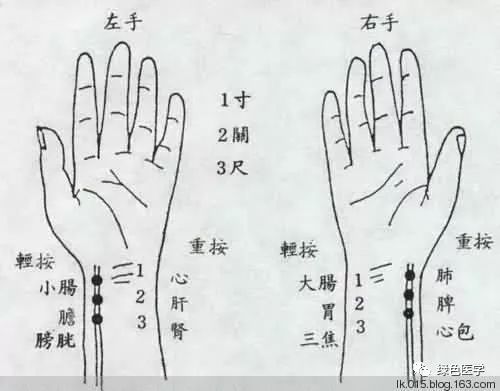
19. Minute Pulse:
Extremely fine and soft, seemingly present yet absent.
〔Main Disease Poem〕
Qi and blood are weak, pulse is also weak; aversion to cold, fever, and profuse sweating.
In men, indicates extreme labor and various deficiencies; in women, indicates bleeding and discharge.
At the inch, minute indicates shortness of breath or heart fright; at the guan, minute pulse indicates fullness.
At the chi, indicates weakness of essence and blood; aversion to cold, pain, and moaning.
Minute indicates long-term deficiency and blood weakness; yang minute indicates aversion to cold, yin minute indicates fever. 《Pulse Classic》 states: long-term in the year leads to white discharge, prolonged leakage leads to bone decay.
20. Tight Pulse:
Tight and tense, like cutting a rope.
〔Main Disease Poem〕
Tight indicates various pains due to cold; wheezing, coughing, wind, epilepsy, and vomiting cold phlegm.
Floating tight indicates exterior cold; tight sinking indicates warmth and dispersal naturally.
At the inch, tight indicates human welcoming qi; at the guan, indicates heart and abdominal pain.
At the chi, tight indicates cold; indicates running pig and hernia pain.
Tight indicates cold and pain; human welcoming tight indicates injury from cold; qi mouth tight indicates injury from food; chi tight indicates pain in the abdomen.
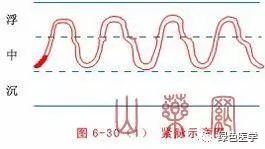
21. Moist Pulse:
Floating, fine, and soft, lightly taken it is obtained.
〔Main Disease Poem〕
Moist indicates blood loss and yin deficiency disease; marrow sea and dan tian are already depleted.
Profuse sweating at night steams into the bones; blood mountain collapses, dampness invades the spleen.
At the inch, moist indicates yang is weak and spontaneous sweating is excessive; at the guan, indicates qi deficiency.
At the chi, indicates injury to essence and blood, cold is severe; warming and tonifying true yin can resolve the illness.
Moist indicates blood deficiency disease, also indicates injury from dampness.
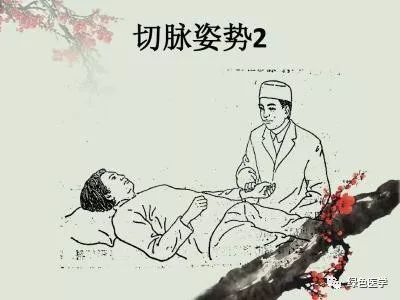
22. Weak Pulse:
Sinking, fine, and soft, heavy pressure feels like it is about to disappear.
〔Main Disease Poem〕
Weak pulse indicates yin deficiency and yang qi decline; aversion to cold, fever, and muscle atrophy.
Much fright and sweating reduce spirit; tonifying qi and regulating nutrients must be treated urgently.
At the inch, weak indicates yang deficiency disease; at the guan, indicates stomach weakness and spleen decline.
To seek yang sinking into yin disease, must push both parts of the spirit gate.
Weak indicates qi deficiency disease. Zhang Zhongjing states: yang sinks into yin, hence aversion to cold and fever. Also states: weak indicates muscle, sinking indicates bone; yang floating, yin weak, blood deficiency, and muscle tightness. Liu’s theory states: qi deficiency leads to weak pulse; inch weak indicates yang deficiency, chi weak indicates yin deficiency, guan weak indicates stomach deficiency.
23. Leather-like Pulse:
Floating, string-like, and empty, like pressing a drum skin.
〔Main Disease Poem〕
Leather-like pulse resembles pressing a drum skin; hollow string-like indicates cold deficiency.
Women postpartum and with bleeding; men with nutrient deficiency or nocturnal emissions.
24. Firm Pulse:
Sinking, solid, and strong, large string-like, felt with heavy pressure, firm and unmovable.
〔Main Disease Poem〕
Cold leads to firm and solid; internal cold pain affects the spleen.
Hernia and stagnation are not worries; blood loss and yin deficiency must be avoided.
Firm indicates cold and solid disease; wood solid indicates pain. Bian Que states: soft indicates deficiency, firm indicates excess. In cases of blood loss, the pulse should be sinking and fine; if floating large and firm, it indicates death; deficiency disease shows solid pulse.
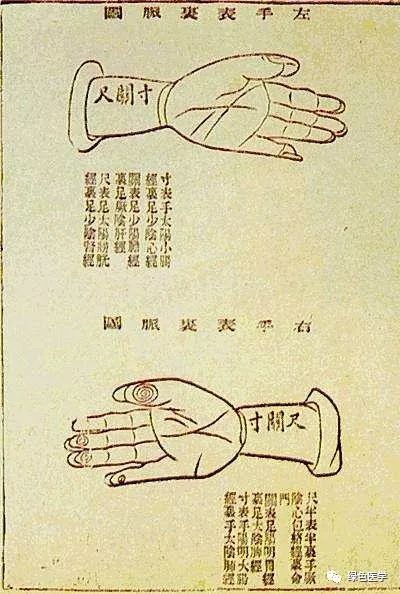
25. Moving Pulse:
Slippery and rapid like beans, clearly seen at the guan.
〔Main Disease Poem〕
Moving pulse specializes in pain and fright; sweating due to yang movement, heat due to yin.
Or due to diarrhea, cramping disease; men with loss of essence, women with bleeding.
Zhang Zhongjing states: movement indicates pain and fright. 《Suwen》 states: yin deficiency and yang colliding, called bleeding. Also states: women with less than normal yin pulse indicates pregnancy.
26. Hidden Pulse:
Pressing the muscles to the bones, only felt with heavy pressure.
〔Main Disease Poem〕
Hidden indicates frequent vomiting and diarrhea, abdominal pain often due to retained food.
Accumulated drink and old phlegm cause stagnation; dispersing cold and warming the interior must not be delayed.
Food stagnation in the chest, double inch hidden; wanting to vomit but unable to, always in distress.
At the guan, abdominal pain is heavy and obstructed; at the chi, hernia pain and abdominal rupture.
In cases of cold damage, one hand pulse hidden indicates single hidden; two hands pulse hidden indicates double hidden; cannot use yang symptoms to diagnose yin. This indicates internal fire evil, cannot be released; yang extreme appears as yin, hence the pulse is hidden, must have great sweating to resolve. Just like a long drought will bring rain, the world will be dark, after rain all things will revive. There are also cases of mixed yin cold damage, first having hidden yin inside, then externally feeling cold, yin is strong and yang is weak, four pulses are reversed, six pulses are hidden; must apply ginger and moxibustion to the guan, then the pulse will return. If tai xi and chong yang have no pulse, it indicates certain death.
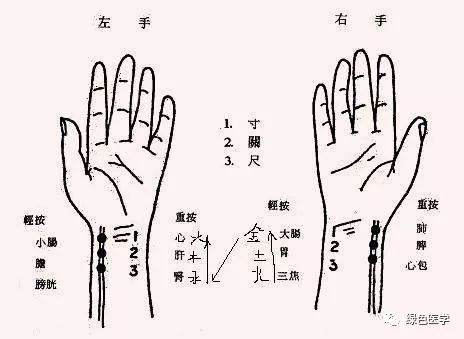
27. Scattered Pulse:
Floating and scattered without root, reaching numbers unclear.
〔Main Disease Poem〕
Left inch indicates palpitations, right inch indicates sweating; excess drink at the left guan indicates soft and scattered.
Right guan soft and scattered indicates swelling; scattered at both chi indicates soul must be severed.
28. Hollow Pulse:
Like twisting a scallion, solid outside and hollow inside.
〔Main Disease Poem〕
At the inch, hollow indicates blood accumulation in the chest; at the guan, hollow indicates intestinal and stomach abscess.
At the chi, indicates much blood loss, red urination, and bleeding in the middle.

— THE END —
⊙The article is reproduced from the internet, content is for reference only, copyright belongs to the original author, if there are any objections, please inform us to delete in time.
⊙For various prescriptions or therapies mentioned in the text, please consult a physician, do not use blindly, this platform does not bear any responsibility for any consequences!
Recommended Courses
Jingpai (Painless) Wool Picking and Root Cutting Therapy

